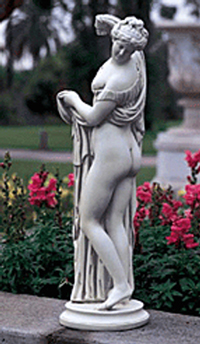venus +
(Latin: goddess of love; love, loveliness, attractiveness, beauty, charm)
Callipygian Venus
Venus, thought to be more beautiful than any mortal woman, is a sculpture called Callipygian, meaning "of the beautiful bottom" or "of the beautiful backside". The late Hellenistic original once stood at the center of a pool in Nero’s Domus Aurea in Rome.


devenustate
1. To deprive of beauty, comeliness, or grace.
2. To disfigure or to deform.
2. To disfigure or to deform.
Venus
1. In Roman Mythology, the goddess of love and beauty.
2. An ancient Italian goddess of gardens and spring, identified by the Romans with the Greek Aphrodite as the goddess of love and beauty.
3. An exceptionally beautiful woman.
4. In archaeology, a statuette of a female figure, usually carved of ivory and typically having exaggerated breasts, belly, or buttocks; often found in Upper Paleolithic cultures from Siberia to France.
5. The second planet from the sun, having an average radius of 6,052 kilometers (3,761 miles), a mass 0.815 times that of Earth, and a sidereal period of revolution about the sun of 224.7 days at a mean distance of approximately 108.2 million kilometers (67.2 million miles).
2. An ancient Italian goddess of gardens and spring, identified by the Romans with the Greek Aphrodite as the goddess of love and beauty.
3. An exceptionally beautiful woman.
4. In archaeology, a statuette of a female figure, usually carved of ivory and typically having exaggerated breasts, belly, or buttocks; often found in Upper Paleolithic cultures from Siberia to France.
5. The second planet from the sun, having an average radius of 6,052 kilometers (3,761 miles), a mass 0.815 times that of Earth, and a sidereal period of revolution about the sun of 224.7 days at a mean distance of approximately 108.2 million kilometers (67.2 million miles).
venushair
Delicate maidenhair fern branches (Adiantum capillus-veneris) with slender black stripes that have been used in the preparation of expectorants and demulcents.
Venusian
1. Relating to, or characteristic of the planet Venus.
2. A hypothetical inhabitant of the planet Venus.
3. An imaginary being inhabiting or coming from Venus.
2. A hypothetical inhabitant of the planet Venus.
3. An imaginary being inhabiting or coming from Venus.
venust
Beautiful.
A fear of beautiful women: Sam has a venustaphobia that gorgeous females don't have any interest in him and so they don't consider him worth being with, especially as a husband or an unmarried partner.
<img src="/img/left_arrow_sm.gif" alt="" /> <img src="/img/right_arrow_sm.gif" alt="" />
Showing 1 page of 7 main-word entries or main-word-entry groups.
